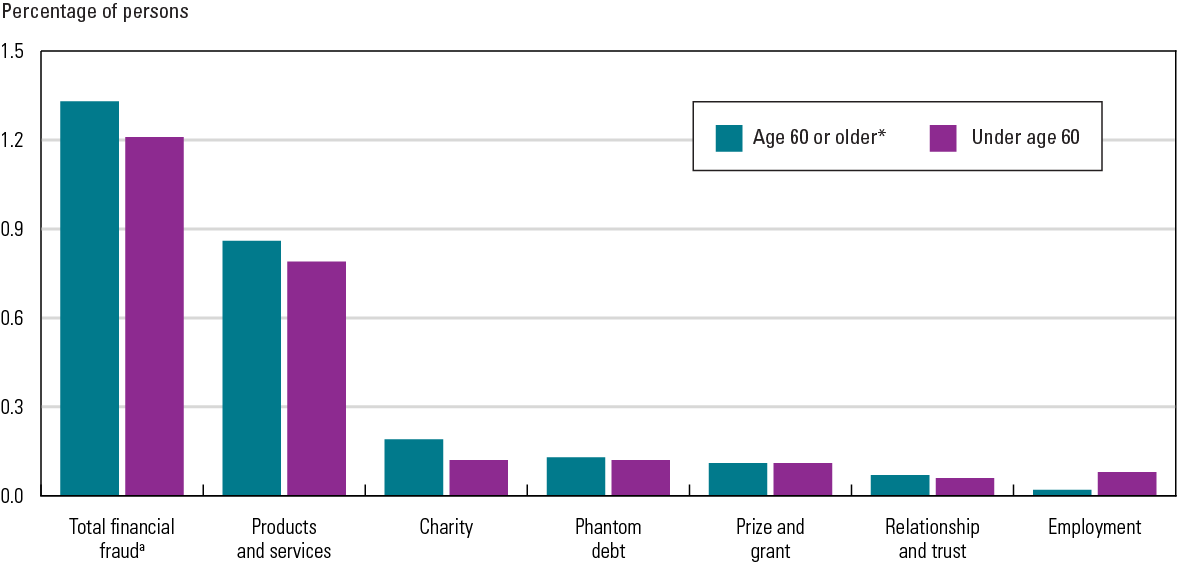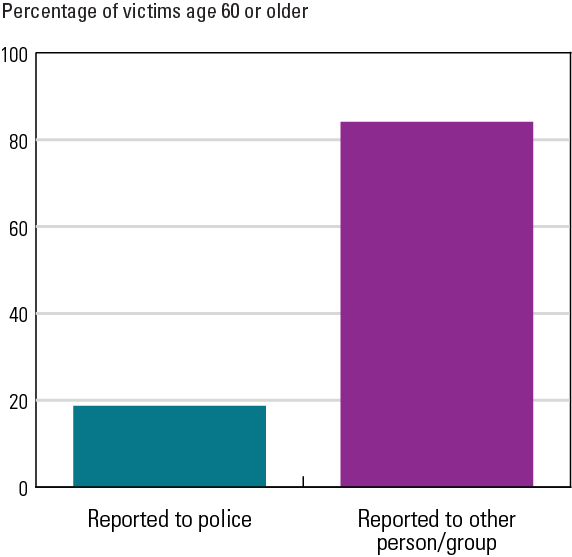The
population of older adults has expanded. The percentage of persons age
60 or older in the United States increased by 33% from 2010 to 2020 and
is expected to continue to grow.[1]
The Better Business Bureau reports that older adults[2] lose more than $36 billion to financial fraud every year.[3]
According to the FBI’s Internet Crime Complaint Center, 105,301 cases
of fraud against persons age 60 or older were reported in 2020.[4] In 2021, 128,216 offenses against persons age 65 or older were reported through the National Incident-Based Reporting System.[5]
The actual number of fraud cases is unknown as many people do not
report their victimization, and underreporting is especially high for
older adults.[6]
Despite
these facts, there is a lack of research on fraud victimization of
older adults. To date, studies that examine financial fraud have not
been nationally representative, suffer from small sample sizes, or only
include victims who make a formal report. Some studies use varying
definitions of fraud, which may or may not include identity theft.
Additionally, these studies may have other methodological limitations
that lead to a wide range in prevalence estimates.
To
help fill this gap in the literature, this article presents findings
from a nationally representative sample of persons age 60 or older who
experienced personal financial fraud. Data came from the 2017 National
Crime Victimization Survey (NCVS) Supplemental Fraud Survey (SFS).
Review of the Literature
Financial
exploitation of older adults — which generally includes improper use of
funds, property, or resources of another individual — can be divided
into two main categories: financial abuse and financial fraud.
Individuals who know the victim and are in positions of trust (for
example, family members or paid caregivers) commit financial abuse of
older adults, which is also referred to as elder financial abuse.
Strangers mainly commit financial fraud of older adults.[7] Most research to date has focused on financial abuse rather than financial fraud,[8] although some studies include both forms of financial exploitation. This article looks only at financial fraud.
Changes
in the aging brain and declines in cognitive functioning (ranging from
mild impairments to Alzheimer’s disease and dementia) make older adults
more susceptible to scam and fraud.[9] Other risk factors include a lack of financial literacy,[10] social isolation, and loneliness.[11] Older adults also tend to be more trusting than younger adults and less able to recognize deceitful individuals.[12]
Research has consistently found that older adults are more likely to be targets of fraud than younger adults.[13] However, this does not necessarily mean a greater number of older adults are victims of financial fraud.[14]
The 2016 Health and Retirement Study found that 34.8% of persons age 50
or older had been targeted by or had been the victim of a fraud or
investment scam in the past five years.[15] Estimates of financial fraud victimization of older adults differ by the population studied, the definition of fraud used,[16]
and the time frame considered; however, across studies, between 2.7%
and 6.6% of older adults reported experiencing financial fraud in the
past 12 months.[17]
The
consequences of fraud victimization may be more severe for older adults
than younger adults. Research found that they lose more money, on
average, than younger victims.[18]
Financial fraud of older adults is rarely handled through the criminal
justice system. Older fraud victims are unlikely to report the incident
to the police. Prosecutors and law enforcement may be less interested in
pursuing legal action when the victim is an older adult, especially one
who has cognitive difficulties.[19] Other correlates of financial victimization include poor psychological well-being,[20] depression, post-traumatic stress disorder, generalized anxiety disorder, poor overall health,[21] and lower quality of life,[22]
although the directionality of these relationships is not always known.
Although higher rates of fraud are correlated with mental and physical
health problems, experiencing fraud does not necessarily cause negative
health outcomes. However, issues with physical and mental health could
make individuals more vulnerable to fraud victimization.
Data and Methods
This
analysis used data from the Bureau of Justice Statistics’ (BJS) 2017
NCVS SFS. BJS is the nation’s primary source for criminal justice
statistics, and the NCVS is the nation’s primary source of information
on criminal victimization. Each year, the NCVS collects data from a
nationally representative sample of approximately 240,000 persons in
about 150,000 households. The NCVS collects information on nonfatal
personal and property crimes reported and not reported to police,
including data on the victim, the person who perpetrated the crime,[23] and incident characteristics.[24]
From
October through December 2017, BJS administered the SFS to a nationally
representative sample of persons age 18 or older in NCVS-sampled
households. All NCVS and SFS interviews used computer-assisted personal
interviewing, either by telephone or in person. Of the 66,200
NCVS-eligible respondents age 18 or older, approximately 51,200
completed the SFS questionnaire, representing a response rate of 77.3%.
The
SFS collected individual-level data on the prevalence of seven types of
fraud victimization: charity, consumer investment, consumer products
and services, employment, phantom debt, prize and grant, and
relationship and trust. Prevalence is defined as the number or
percentage of unique persons who were victims of fraud at least once
during the reference period. The SFS asked respondents whether they
experienced the different types of fraud in the 12 months prior to the
interview.[25]
The
SFS instrument began with a series of questions on these seven types of
fraud; these questions screened the respondent into the survey if they
reported experiencing one or more eligible types of fraud victimization.
Once a respondent screened in, the interviewer administered the SFS
incident instrument to collect detailed information about the type of
fraud victimization experienced. The incident instrument also collected
data on the characteristics of victims and their patterns of reporting
to the police and other authorities.
In addition to reporting a
fraud victimization in the screener questions, respondents were
classified as fraud victims if they reported that they did not get their
money back in the transaction. This criterion fits the legal definition
of fraud and provided sufficient sample sizes to produce statistical
estimates.
If respondents reported experiencing more than one
incident of the same type of fraud, the SFS asked them to think about
the most recent incident that occurred in the last 12 months. This
article defines older adults as persons age 60 or older, which is
consistent with the Elder Abuse Prevention and Prosecution Act of 2017
and Older Americans Act of 1965.[26]
Results
In 2017, about 1.33% (929,570) of persons age 60 or older experienced at least one incident of fraud (see exhibit 1).
There were no statistically significant differences between the
percentage of persons age 60 or older and persons age 59 or younger who
experienced fraud. This pattern held when examining by fraud type both
for persons age 60 or older and for persons age 59 or younger.
Exhibit
1. Percentage of persons who experienced at least one incident of
personal financial fraud in the past 12 months, by type of fraud and age
of person, 2017.
Source: Bureau of Justice Statistics, National Crime Victimization Survey, Supplemental Fraud Survey, 2017.
Note: Estimates are based on the most recent incident for that fraud type.
* Comparison group.
a Consumer investment fraud is excluded due to too few sample cases, but it is included in total financial fraud.
Source: Bureau of Justice Statistics, National Crime Victimization Survey, Supplemental Fraud Survey, 2017.
For estimates and standard errors, see appendix tables 1a and 1b.
Regardless
of victim age, the most common type of fraud was consumer products and
services fraud; about 65% of all fraud victims experienced it (see exhibit 2).
Technology support scams, automotive repair scams, weight-loss product
scams, and online marketplace scams are common examples of this fraud
type.
Exhibit 2. Number and percentage of victims who experienced personal financial fraud, by type of fraud and age of victim, 2017.
| | Number of victims | Percentage of victims | Percentage of all persons |
|---|
| Type of fraud | Age 60 or older* | Under age 60 | Age 60 or older* | Under age 60 | Age 60 or older* | Under age 60 |
|---|
| Total financial frauda | 929,570 | 2,109,630† | 100.0 | 100.0 | 1.33 | 1.21 |
| Products and services | 604,200 | 1,378,040† | 65.0 | 65.3 | 0.86 | 0.79 |
| Charity | 135,880 | 206,070 | 14.6 | 9.8 | 0.19 | 0.12 |
| Phantom debt | 91,940 | 204,680† | 9.9 | 9.7 | 0.13 | 0.12 |
| Prize and grant | 77,500 | 186,180† | 8.3 | 8.8 | 0.11 | 0.11 |
| Relationship and trust | 48,600 | 106,580‡ | 5.2 | 5.1 | 0.07 | 0.06 |
| Employment | 13,040! | 137,420 | 1.4! | 6.5 | 0.02! | 0.08 |
Note:
Estimates are based on the most recent incident for that fraud type.
Numbers and percentages of victims do not sum to totals because persons
could experience multiple types of fraud.
* Comparison group.
† Significant difference from comparison group at the 95% confidence level.
‡ Significant difference from comparison group at the 90% confidence level.
!
Interpret estimate with caution. Estimate is based on 10 or fewer
sample cases, or coefficient of variation is greater than 50%.
a Consumer investment fraud is excluded due to too few sample cases, but it is included in total financial fraud.
Source: Bureau of Justice Statistics, National Crime Victimization Survey, Supplemental Fraud Survey, 2017.
For standard errors, see appendix table 2.
Data
from the 2017 SFS show that 79.7% of fraud victims age 60 or older were
non-Hispanic white persons, a significantly higher percentage than the
62.0% of all fraud victims who were non-Hispanic white persons (see exhibit 3).
The percentage of victims age 60 or older who were never married (8.1%)
was lower than the percentage of all victims who were never married
(31.1%). However, the percentage of victims age 60 or older who were
widowed (22.0%) was significantly higher than the percentage of all
victims who were widowed (8.0%). There were no statistically significant
differences by victim sex, household income, or location of residence
in the percentage of victims of financial fraud of any age and those age
60 or older.
Exhibit 3. Percentage of all
victims and victims age 60 or older who experienced personal financial
fraud, by demographic characteristics, 2017.
| Demographic characteristics | Percentage of all
victims age 60 or older* | Percentage of all victims |
|---|
| Total | 100 | 100 |
| Sex |
| Male | 43.8 | 45.2 |
| Female | 56.2 | 54.8 |
| Race/Hispanic origina |
| Whiteb | 79.7 | 62.0† |
| Blackb | 7.8 | 15.6† |
| Hispanic | 9.5 | 14.8‡ |
| Otherb,c | 3.0! | 7.6 |
| Marital status |
| Never married | 8.1 | 31.1† |
| Married | 46.7 | 41.5 |
| Widowed | 22.0 | 8.0† |
| Divorced or separated | 22.2 | 19.0 |
| Household income |
| Less than $25,000 | 17.7 | 23.5 |
| $25,000-$49,999 | 31.1 | 27.4 |
| $50,000-$99,999 | 29.6 | 27.7 |
| $100,000 or more | 21.6 | 21.4 |
| Location of residence |
| Urband | 34.0 | 39.3 |
| Suburbane | 52.8 | 48.5 |
| Ruralf | 13.2 | 12.2 |
Notes: Estimates are based on the most recent incident of fraud. Details may not sum to totals due to rounding.
* Comparison group.
† Significant difference from comparison group at the 95% confidence level.
‡ Significant difference from comparison group at the 90% confidence level.
a
There were no victims of personal financial fraud age 60 or older who
were American Indian or Alaska Native and Native Hawaiian or Other
Pacific Islander.
b Excludes persons of Hispanic origin
(e.g., “white” refers to non-Hispanic white persons and “Black” refers
to non-Hispanic Black persons).
c Includes persons who
were Asian; Native Hawaiian or Other Pacific Islander; American Indian
or Alaska Native; and two or more races. Categories are not shown
separately due to small numbers of sample cases.
d Within the principal city of a Metropolitan Statistical Area (MSA).
e Within an MSA but not in a principal city of the MSA.
f Not within an MSA.
Source: Bureau of Justice Statistics, National Crime Victimization Survey, Supplemental Fraud Survey, 2017.
For standard errors, see appendix table 3.
Victims
may not report a crime for a variety of reasons, including fear of
reprisal or getting the person who perpetrated the crime in trouble,
believing that nothing could or would be done to help, and believing the
crime to be a personal issue or too trivial to report. About 1 in 5
(19%) fraud victims age 60 or older reported the incident to the police,
and 84% of victims age 60 or older reported the incident to another
person or group (see exhibit 4).
Other people or groups that the victim may report the incident to
include their family or friends; a bank, credit card company, or other
payment provider; a state or local consumer agency; a lawyer; or a
federal consumer agency.
Exhibit 4. Percentage of financial fraud victims age 60 or older who reported to police or other persons or groups, 2017.
For standard errors and confidence intervals, see appendix tables 4a and 4b.
In total, fraud victims age 60 or older lost nearly $1.2 billion in 2017, and they lost an average of $1,270 (see exhibit 5).
More than half (65%) of the total losses resulted from consumer
products and services fraud. On average, consumer products and services
fraud victims age 60 or older lost about $1,190, which was significantly
more money than the amount lost by victims of charity fraud ($60).
Exhibit
5. Financial losses among victims age 60 or older who experienced at
least one incident of personal financial fraud in the past 12 months, by
type of fraud, 2017.
| Type of fraud | Mean | Median | Total lossesa |
|---|
| Total financial fraudb,c | $1,270 | $200 | $1,161,716,270 |
| Products and services* | $1,190 | $200 | $756,075,010 |
| Phantom debt | $1,050 | $400 | $103,808,460† |
| Prize and grant | $490 | $100 | $44,310,710† |
| Charity | $60† | $30 | $10,844,140† |
Note: Estimates are based on the most recent incident of that fraud type. Details may not sum to totals due to rounding.
* Comparison group.
† Significant difference from comparison group at the 95% confidence level.
a
The percentage of victims who experienced one type of fraud multiple
times during the reference period varied from 1% to 6%. To account for
these losses, the average loss for each type of fraud was added to the
amount lost by the victim in the most recent incident and then added to
total losses.
b Total financial losses are expected to be
greater than the amounts shown in this table due to top coding, a
procedure used to protect respondents from disclosure risk.
c
Employment and investment fraud are excluded due to too few sample
cases, but they are included in total financial fraud. Relationship and
trust fraud is excluded due to unreliability of the estimate, but it is
included in total financial fraud.
Source: Bureau of Justice Statistics, National Crime Victimization Survey, Supplemental Fraud Survey, 2017.
For standard errors, see appendix table 5.
Those
who lost the average amount of $1,270 or less were significantly less
likely to report the incident to the police (13%) than those who lost
more than $1,270 (47%). Victims who lost $1,270 or less were also
significantly less likely to report the fraud to another person or group
(82%) compared to victims who lost more than $1,270 (95%).
Fraud
victims experience different socioemotional consequences. About a third
(31%) of victims age 60 or older experienced moderate emotional distress
(see exhibit 6).
About 29% experienced mild distress and 27% experienced severe
distress. One in 20 (5%) fraud victims age 60 or older reported
experiencing relationship problems with friends or family because of the
incident.
Exhibit 6. Percentage of victims age
60 or older who experienced socioemotional problems as a result of
personal financial fraud, 2017.
| Type of socioemotional problem | Percentage of victims age 60 or older |
|---|
| Emotional distress |
| None | 11.7 |
| Mild | 28.9 |
| Moderate | 30.6 |
| Severe | 26.6 |
| Family/friend relationship problemsa | 4.6 |
Note:
Details may not sum to total because victims could experience emotional
distress and family/friend relationship problems. Excludes missing
data, which accounted for 2% of fraud incidents.
a
Includes experiencing significant problems with family or friends, such
as having more arguments than before the victimization, an inability to
trust, or not feeling as close after victimization.
Source: Bureau of Justice Statistics, National Crime Victimization Survey, Supplemental Fraud Survey, 2017.
For standard errors and confidence intervals, see appendix table 6.
Implications and Conclusions
Prior
research and data on fraud are limited by issues such as small sample
sizes, nonrepresentative samples, and variations in the definition of
fraud and types of crimes included. To date, many of the data have
relied on statistics collected by the FBI. Despite limitations, these
data are a useful source of information because the FBI consistently
collects them, which provides an opportunity to report on trends over
time. The FBI also collects data on the severity of the problem and
types of fraud targeting older adults. Data from the FBI Internet Crime
Complaint Center, for example, show that financial fraud of older adults
is a growing problem both in terms of number of incidents reported and
total dollars lost.[27]
However,
based on the SFS data analyzed in this article, we know that statistics
collected by law enforcement do not capture the complete picture. The
SFS aims to address the need for nationally representative estimates of
fraud, both reported and not reported to the police. The SFS complements
the FBI data sources by including victims who do not report to the
police. Additionally, the SFS reveals that the demographic profile of
financial fraud victims age 60 or older differs from the profile of
fraud victims age 18 or older. Future research on older adults who do
not report their victimizations will also provide a more comprehensive
picture of fraud in the United States.
Additional areas of
research offer opportunities to examine the evolving nature of fraud
victimization, including the intersection of fraud and cybercrime, and
types of fraud that target older adults. These gaps in knowledge about
financial fraud of older adults should be addressed through research in
the future.
The
Bureau of Justice Statistics defines and measures financial fraud and
identity theft separately and collects data on each crime through
separate National Crime Victimization Survey supplemental surveys. The
primary distinction between the two crimes is whether respondents
willingly provided personal information to the person who perpetrated
the crime.
In the case of identity theft, victims’ personal
information (for example, bank account information or Social Security
number) is obtained and used without permission. For an incident to be
classified as identity theft, victims must experience the misuse of an
existing account, opening of a new account, or the misuse of personal
information. Identity theft is like other types of theft, whereby
victims’ information is taken without their knowledge, consent, or
control. For more information, see https://bjs.ojp.gov/data-collection/identity-theft-supplement-its.
For
personal financial fraud — the focus of this article — victims
willingly provide personal information but are deceived about what they
will receive in return for that information. For an incident to be
classified as a personal financial fraud, victims must be knowingly and
intentionally deceived and lose money in the transaction. For more
information, see https://bjs.ojp.gov/data-collection/supplemental-fraud-survey-sfs.
Return to text.
Appendix Tables




















